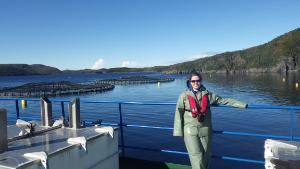News
Friday, July 11, 2014

Jillian Westcott at an aquaculture farm site.
An aquaculture researcher and faculty member at the Marine Institute of Memorial University will begin conducting a project this fall which will aid in solidifying Atlantic Canada as a world leader in innovative and safe aquaculture practices for Atlantic salmon farming.
Jillian Westcott recently received $100,000 in funding from the Research & Development Corporation (RDC) through its Ignite R&D program to examine the efficacy of cultured cleaner fish (cunners) as a delousing tool for Atlantic salmon.
In the first step of the project, proof of concept, a Master of Science (Aquaculture) student will be working with Westcott to research several factors which include examining how efficient cunners are at removing sea lice from salmon at various water temperatures and stocking densities, what types of pathogens they may carry and how they perform in co-culture with Atlantic salmon (survival, health and welfare).
The long-term goal of this project is the development of commercially cultured cleaner fish as a means of sea lice management and control for use in the province’s Atlantic salmon sea cage sites.
“I am elated to receive funding from RDC for my project, which will enable the procurement of a graduate student who will be trained in the areas of sea lice, cunner biology and fish health and welfare throughout the course of the research,” said Westcott. “Should this method for sea lice mitigation and control prove successful, the investment in cleaner fish technology will contribute to the long-term sustainability of the growing salmonid sector of the aquaculture industry in Newfoundland, as sea lice pose significant health and economic challenges to the productivity of commercial Atlantic salmon operations.”
Westcott’s project stems from recent growth and anticipated increase of the aquaculture industry in Newfoundland and Labrador. The naturally occurring marine parasite referred to as “sea louse” is a major pathogen of concern for Atlantic salmon farmers globally. Sea lice attach themselves to the outside of their host and cause damage by their feeding activity on the host mucous, skin and blood. The significant fish health and economic impacts that these parasites have on farmed Atlantic salmon production globally have necessitated the development of alternative methods for sea lice management.
Cultured and wild caught cleaner fish have been used successfully in Europe in combination with chemical treatments as an environmentally friendly biological means of managing and controlling sea lice on Atlantic salmon farms. However, the only cleaner fish species found in Newfoundland waters is the cunner, which scientists know little about in regards to its ability to consume sea lice on salmon and its adaptability to culture conditions.
This project provides an opportunity for local and regional collaboration with the Atlantic Canada aquaculture industry, Memorial University’s Department of Ocean Sciences and interdisciplinary research and development with the Department of Fisheries and Aquaculture.
The research findings are anticipated to provide a direct opportunity for the transfer of knowledge related to cleaner fish technology to the salmonid sector of the aquaculture industry of Newfoundland and Labrador as well as in other Canadian provinces. It is also expected to increase the capacity for development of intellectual property through publication of research findings in peer-reviewed journals and industry publications.
Once Westcott has successfully completed the initial proof of concept, the next phase of the project will involve sea cage trials to evaluate the efficacy of cultured cleaner fish as a means of sea lice mitigation and control. This future field work will require collaboration with private aquaculture companies to allow access to farmed salmon for sea cage trials with cunners.





